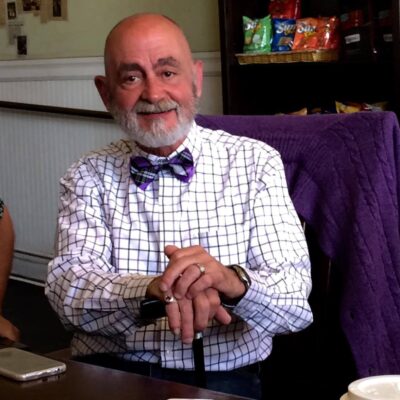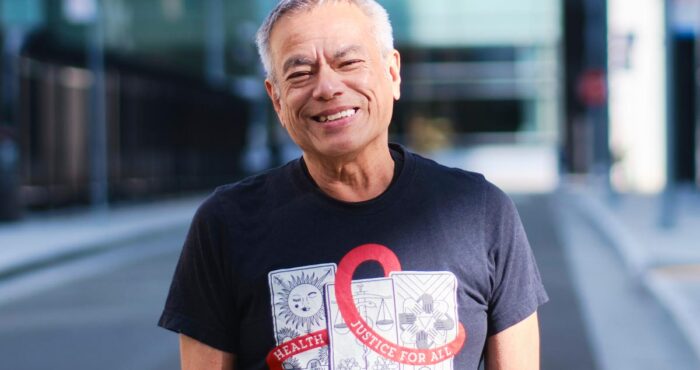Activists across California celebrated historic victories for older people with HIV/AIDS in July 2021.
SB 258
First, on July 15, Senate Bill 258, the HIV & Aging Act, authored by Senator John Laird (D-Santa Cruz), easily passed in the California Assembly, by unanimous bipartisan vote. Governor Gavin Newsom signed the bill into law on July 23. The legislation designates older people with HIV as a population of “greatest social need” and will help to improve access to a wide range of services and supports for older adults.
Before the passage and signing of SB-258, existing law, the Mell-Granlund Older Californians Act, defined “greatest social need” as “the need caused by noneconomic factors that restrict an individual’s ability to perform normal daily tasks or that threaten an individual’s capacity to live independently. These factors include physical or mental disability, language barriers, and cultural or social isolation caused by, among other things, racial and ethnic status, sexual orientation, gender identity, or gender expression.” SB-258 adds being HIV-positive to that list of noneconomic factors. The law will go into effect on January 1, 2022.
California state budget wins
The second victory appears in the FY 2021-22 State Budget signed on July 27, which $13 million to end the epidemics of HIV, STIs, viral hepatitis, and overdose. That figure includes $5 million, the largest state investment to date, to establish up to five demonstration projects to address the unique medical and support service needs of older people with HIV.
The demonstration projects will be modeled after the Zuckerberg San Francisco General Hospital’s Golden Compass Program, a highly successful program providing medical and mental healthcare for people with HIV over 50. The funding request from APLA Health, San Francisco AIDS Foundation, and the statewide End the Epidemics coalition was championed by members of the LGBTQ+ Caucus and legislative leadership, with enthusiastic support from grassroots HIV/AIDS organizations like AIDS Project Los Angeles, the Los Angeles LGBTQ Center, and San Francisco AIDS Foundation’s HIV Advocacy Network (HAN).
San Francisco budget wins
On the local level, San Francisco activists are also celebrating home-grown victories in the City and County of San Francisco 2021-2022 budget. The San Francisco Board of Supervisors, in response to lobbying by the HIV Advocacy Network and other activists in the City, allocated $750,000 for HIV housing subsidies; $200,000 for mental health services for long-term survivors; $340,000 to preserve the HIV care safety net, and continued the current funding of the HIV prevention safety net.
Ande Stone of HAN said, “Although we didn’t get everything we were fighting for [no funds for safe injection sites], make no mistake, what we’ve achieved is something to celebrate and be proud of! These funding increases would not have happened without community pressure. Together we took action to make our voices heard and achieved some real wins for our community.”
Addressing the unique health needs of older people living with HIV
These local and statewide budget victories will provide funds that address the unique, often unmet needs of older PLHIV in the state. Thanks to effective HAART medications, people are living with HIV far longer than anyone imagined during the first decades of the pandemic. The Center for Disease Control and Prevention estimates that there are 1.2 million people living with HIV in the United States, of whom more than 50% are over the age of fifty; they estimate further that by 2025, that percentage will be closer to 70%; here in San Francisco, it is already 65% or more. We long-term survivors are the largest cohort of PLHIV in the country. People over the age of 50 also account for 17% of new HIV diagnoses and 71% of all deaths of people living with HIV.
As we age with HIV, we confront premature aging, subject to multiple comorbidities that appear some twelve to fifteen years earlier than our HIV-negative counterparts. Because the virus has wreaked havoc on our immune systems, in some of us for nearly four decades, we are more susceptible to cardiovascular diseases, lymphoma, type 2 diabetes, lung diseases, cognitive difficulties (such as memory problems, loss of brain volume), osteoporosis and fractures, kidney failure due to enhanced susceptibility to infections such as hepatitis B and C. Polypathology (a combination of two or more of these conditions) can and does occur in the HIV-negative population, of course, but it occurs in HIV-positive folx some fifteen years earlier than in the general population, with symptoms of polypathology beginning at age forty instead of fifty-five. The lack of gerontologists and geriatricians who know how to treat patients with HIV and of psychiatrists and psychologists who are equipped to deal with the depression and PTSD (“AIDS Survivor Syndrome”) that afflict people aging with HIV means that mental healthcare of older PLHIV is hard to come by.
APLA Health Chief Executive Officer Craig E. Thompson said in a press release “Unfortunately, our current health and social service systems are not yet prepared to address the unique needs of this population… These historic actions will help to ensure that people aging with HIV have the resources and support they need to thrive.”
These are indeed important, historic budget victories for older PLHIV. But will they be enough?
In September 2021, a group of activists in San Francisco (Harry Breaux, Writer & Member SFAF HIV Advocacy Network; Vince Crisostomo, Director of Aging Services, San Francisco AIDS Foundation; Michael Rouppet, Affordable Housing, Tenants Rights & Harm Reduction Advocate; and Paul A. Aguilar, Writer, Filmmaker, SFAF HIV Advocacy Network; and I) composed The San Francisco Principles 2020 (“the Principles”) in response to the lack of presence of long-term survivors at AIDS2020. The Principles is a manifesto, similar to the Denver Principles promulgated in 1983, outlining the challenges we long-term survivors of HIV/AIDS face every day and our demands for health equity and justice. I spoke with some of the co-authors of the Principles about these budget victories. “Is it enough?” I asked. “Will the funds allocated help to address the issues raised in The San Francisco Principles 2020?”
“This victory, although not complete in and of itself, is a step in the right direction of acknowledging the personal devastation of the decimation of a community by the AIDS virus and the attention it needs to honor the experience we, the survivors of death’s near visit, have been through,” Harry Breaux told me. “These funds will provide the continued building of the framework for better physical, mental and spiritual well-being of those so traumatically affected by the impact of a double pandemic (HIV/AIDS and COVID-19). They will help to address the issues raised in the principles if they are utilized in an informed and comprehensive way. ‘This comprehensive way’ needs to be informed by those whose lives have been affected and understand it from an experiential perspective. It cannot be done without the DIRECT support and consideration of long-term survivors themselves.” As to whether the newly allocated funds are enough, “[That] depends on the definition of ‘enough.’ Initially, I say NO! But when broken into smaller pieces that can oil the wheels of support for the long-term survivor, it can be a big chunk of progress in this particular and specialized area.”
HAN member Paul Aguilar also expressed his pleasure in the budget victories but tempered that enthusiasm with skepticism. “To me, these victories are only a starting point,” he said. “To be honest, I was surprised that we secured the funding we did, and that Governor Newsom signed SB 258. Many of my peers, myself included, began to feel that the medical community and government agencies just wanted us to die and go away.
“The $5 million for demonstration projects modeled after the Golden Compass program is crucial to begin to address the special needs of a geriatric HIV population,” he continued. Nobody ever thought there would be a geriatric HIV patient. Aging with HIV is something that’s never been done until now: we are the first generation to age with HIV, and our needs are different after years of being plied with different chemicals and treatments and the long-term effects of those meds have yet to be revealed.”
Michael Rouppet, a HAN member and a fierce advocate for “housing is healthcare,” also expressed tempered enthusiasm. “I see the funding victories and passage of SB 258 as necessary successive steps forward and a cornerstone for the next steps ahead. Organizing works. The next steps forward [must] address more longstanding structural changes needed in national healthcare, universal access and costs, including Housing As Healthcare as an initiative. “SB 258 now recognizes PLWHA as an aging population, and recognition is an essential victory to secure future asks. This year’s funding victories in California will advance the effort to establish a more comprehensive Golden Compass model,
“However,” he continued, “we are still sorely lagging in comprehensive results throughout the state and the urgency to address these needs increases each year that our HIV population continues to age. As a group, The San Francisco Principles is committed to continuing our advocacy for advancing these issues in policy and funding areas because we are living by the results we achieve as community stakeholders.”
While there is much to applaud, much to celebrate in these local and statewide budget victories for older PLHIV, these victories must be regarded as merely first steps in the long process of meeting the physical and mental healthcare needs of California’s and San Francisco’s long-term HIV/AIDS survivors as outlined in The San Francisco Principles 2020. Much, much more remains to be done. We at the Principles, HAN, and other activists must continue to pressure local, state, and the federal governments to do more.










